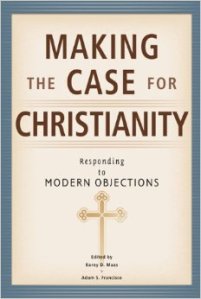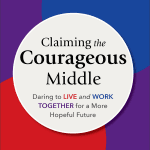Every time I see a book on apologetics by Lutherans, my pulse quickens a bit. There is no doubt that this is an area where we have not been as strong as we could be, and so I see apologetics as an important issue for Christians to be aware of and understand, at least to a some degree.
This book is truly worth the read and I think it has something that will interest most everyone – even those perhaps not particularly interested in apologetics. I especially appreciated the chapters by John Bombaro and Angus Menuge, “The Scandal of Christian Particularity” and “Gratuitous Evil and a God of Love”, respectively, and readers can look at posts that I did on these chapters here and here. And I think all of the chapters in this volume are quite good and the arguments are timely and intelligent – these are men on the “front lines” so to speak. For the most part, I concur with the ringing endorsements on the back of the book from Christians of various denominations. You can read the foreword and introduction here.
That said, this book also helped to clarify in my mind the difficulties I have with the typical Lutheran apologetical approach and helped me to create the previous series of posts where I attempted to put some of John Warwick Montgomery’s arguments in a stronger frame (see the introduction and part I, part II and part III).
What follows is basically that same argument from a different angle, and condensed a great deal.
In the background of every book about apologetics in general, and every Lutheran book about apologetics in particular, are questions about the role of reason, or argument, in the evangelistic task.
At the end of the book, Adam Francisco writes:
“Hopefully this volume will provide some small impetus for a recovery of or renewed emphasis on engaging those who have rejected the Christian faith, with the goal of persuading them that their doubts or objections to the Gospel are unfounded.” (p. 200)
“Persuade” – what does this mean? How does this occur? What about the point that doubt itself can be associated with rebelliousness? (see this post) On the one hand, I think we can truly say that the Holy Spirit guides us as we use any and all reasonable arguments as seem appropriate to defend the faith and gain a hearing for the Gospel. As Gene Veith opens the book in the foreword:
“The word apologetics comes from the Greek word for “defense.” Christian apologetics is not necessarily about trying to argue someone into the faith, if that were possible. At its heart, apologetics is about defending Christianity from those who attack it. Today Christianity is being attacked from so many different sides, tarnished with so many false charges, and obscured with so many misconceptions that the apologetics enterprise – that is, defending the faith – is critically important. The attacks need to be fended off, the charges answered, and the misconceptions cleared up so that Christianity can at least gain a hearing, which is all the Word of God needs to create faith (Romans 10:17).”
In other words, the Holy Spirit works with us as we speak the plain truth – revealing to persons that some of their objections to the Christian faith cannot be substantiated. With their case weakened, perhaps more openings for hearing Gospel truth – faith-creating truth – are created. We can’t “argue someone into the faith”, but with the Spirit, we can at times destroy their arguments and shake their fleshly confidence.
On the other hand, let us come back to this idea of persuasion – which is a word that can potentially be associated with “arguing someone into the faith”. In Acts, words like “persuade” (as well as “proof” along with it) are indeed used, but even here it is always in the context of seeking to prove to Jews in the Synagogue – from the Scriptures – that the resurrected Jesus is the Christ (see, for example, Acts 17:4, 18:4, and 26:28, see also all of 13 and 14). For example, we are shown that the Apostle Paul worked tirelessly to persuade persons of just this. So this is an interesting kind of persuasion – here the Holy Spirit is simply using the Scriptures, as well as the Apostle’s words about Christ’s fulfillment of them, to reveal the truth to persons that they might have and fully know God – meaning, in these last days, Jesus Christ in the flesh (no doubt, many of these Jews that heard the message were in fact believers like Mary, Zechariah, Elizabeth, Simeon, Anna and Nathaniel – “true Jews” we might say).*
Of course, all of this talk of God’s work in history goes hand in hand with what Korey Moss says in the book’s introduction:
“…To ask whether Jesus existed, or whether he publicly claimed to be God incarnate, or whether he rose from death to establish that claim is not at all to ask an esoteric ‘religious” question such as, ‘what is the sound of one hand clapping?’ It is to ask a question about objective, historical facts.
It is therefore not surprising that the apostles themselves regularly appealed to empirical evidence in their proclamation of Christ. John, for example, insists that he writes about what he and his companions “have heard, which we have seen with our eyes, which we looked upon and have touched with our hands (I John 1:1). Peter, in presenting the case for Christ to a skeptical, even hostile, audience, not only reminds his hearers that he was an eyewitness to the events described, but refers to these events having happened “as you yourselves know” (Acts 2:22)….”
Indeed. That said, Moss goes on to say:
“In similar fashion, the modern apologist says merely, if there are certain objections to the faith which can be addressed by reasonable appeals to evidence – or certain foundational facts which can be similarly established – then, when speaking to the rational unbeliever, one should make every possible use of reasons and evidence. (pp. 4-5)”
Again, here it is time for us to ask how certain words are being used. “Established” – what does this mean? Does it simply mean to pile on more proof – as it seems appropriate to do so – that the unbeliever is responsible for acknowledging? Or are we talking about establishing the facts for the unbeliever that they might be persuaded to believe the Gospel? (while I do not deny that such arguments may “improve the acoustics” such that an unbeliever might be willing to hear more, this would be because they have been somewhat convicted by the Holy Spirit of the truth – the truth that there is much that they are, in fact, suppressing as regards God**).
Here is the key point: are not the glorious facts of the Gospel acts already established, or proven? Is it not our role to help persons to see – through conviction of sin and enlightenment by the Gospel – that this is objectively the case? After all, has not God spoken through eyewitness testimony and the continual historical testimony of reliable men? Again, my thought, in sum, is this: while not denying that the methods used by modern historians are capable of establishing among them and the wider public facts and even meanings (in a limited sense) that are not liable to be disputed, what should prevent us from simply saying that the eyewitness testimony itself we have access to – passed on by reliable men (and recorded as the Holy Scriptures for its safeguarding) is not only our evidence, but our proof? (it is not “the proof” however, but “a proof” as I will discuss more in my upcoming series on the internal testimony of the Holy Spirit) And that God Himself has already established this?
Again, I call to our attention Acts 17:31 – should not God have some say in how man gets to define “proof”? Then, we could go on to say, as Maas closes his introduction,
“by means of reasonable and persuasive argument, as by means of the law, “’very mouth may be stopped’ (Romans 3:19). And that, with mouths closed, way might be made for ears to be opened.” (p. 7)
It seems to me that the fine essays in this volume are not to fall not in the category of “establishing” certain foundational facts – for the historical testimonies that we know from reliable men God has provided do in fact do this – but they fall more into the kind of framework that Dr. Veith provides in his insightful opening paragraph. Again, it seems to me that there is a kind of uneasy tension that exists in Maas’ account.
Maas writes that Christian claims “might at least in theory be verified or falsified either by some deductive logical means or by some inductive empirical means” and also says these are “truth claims which are at least in principal open to logical or empirical evaluation”. That said, only one paragraph later, the “in theory” or “in principle” clauses have disappeared: “Many of Christianity’s fundamental tenets, by contrast, are expressible in propositions capable of being verified or falsified by means of the rational weighing of evidence”. (italics mine pp. 3 and 4)***
Even as I agree with Maas on most everything else he says in this essay (and this recent blog post “It’s Okay To Use Reason To Attack Christian Faith, But Not Defend It?”) I find this problematic, not only for the reasons already noted above, but because of the reasons noted in more detail in the Montgomery series: this approach inadvertently makes concessions to Enlightenment thinking about what may, in fact, genuinely be called knowledge.**** In short, in the dominant Enlightenment mode of thought, the importance of character and trust in the “knowledge equation” are severely minimized, or, some cases, removed altogether. In this case, what we get is an anemic conception of knowledge where things like natural laws, physical evidence, accurate observation, mathematics, logic, and human reason become all that remain. Insofar as these things go hand in hand with the presence of humanity, in this mode of thinking they are basically extracted from human being, from character, from trust.*****
We are in fact left with the unworkable fact-value split – the “two-storied universe” that Francis Schaeffer emphasized, and that satisfies nobody (see this recent post from Daniel Deen at 1517: the Legacy Project where he critiques the fact-value split from a different angle). Nobody that is, except perhaps those who, in an attempt to remain relevant and/or have a bulwark vs nihilsm look to Plato for an assist through Kant and/or other Enlightenment figures (see part I of the Montgomery series).
To drive home my point (hopefully not ad nauseum), I submit that, in theory, if we had nothing else besides the eyewitness testimony that has been passed down to us by reliable men – aided by the presence of the Holy Scriptures as well – that would be more than enough. As concerns the matter of the resurrection of Jesus Christ for example, we know that these things, as Paul says, are true and reasonable (Acts 26) – they are God’s proof to all men (Acts 17) – for they “did not happen in a corner” (Acts 26), “as you yourselves know” (Acts 2:22). The testimony of God’s reliable eyewitnesses – entrusted to and passed down in time from reliable man to reliable man – simply demand to be taken seriously in themselves.
Enlightenment skepticism be damned.******
I suggest that this is the kind of good, strong word the world – and sometimes we to – needs to hear. This is something akin to the confidence displayed by Reformed presuppositionalism, for example, but I think that this view makes more sense in light of the book of Acts, with its emphasis on the importance of fulfilled prophecy and miracles, particularly prophecy-fulfilling miracles.*******
Again, it seems to me that Christian evidential apologetics in general and Lutheran evidential apologetics in particular fall down in failing to deal with these issues, which Kierkegaard, for all of his faults, could have warned us about (see here). Do we not need to spend time looking at “bare-bones” apologetics – and to see clearly what God, not the world, insists is proof?
Lutherans like to utter a lovely shorthand phrase “God doesn’t need your good works but your neighbor does” – and there is no doubt that this new book above may be particularly helpful to you as you look to love your neighbor with God’s strong love. This said, I also think it does us well to re-emphasize that, when it comes to convicting our neighbor of sin that they might be ready for Christ (see John 16: 8-11) we do not need to provide our own answers or proof precisely because God already done that in Christ!
So is the book bad? No, I am just suggesting reading some of the essays in particular with the above firmly in mind. Thinking critically in a biblical kind of way.
Again, particularly for the reasons given by Gene Veith in the quotation above, I am abundantly thankful for this book and the good work that these men have done, utilizing their reason for the glory of God and His Christ. Insofar as we are able and given the opportunity, we should indeed, like the Apostle Paul, seek to engage our neighbors about their beliefs and to intelligently address their questions, concerns, objections, etc. Loving one’s neighbor demands that each of us, as we are able, do just this.
In short, this book enables our proclamation of the Lord’s deeds for us and our salvation to be fleshed out to an even greater degree. It helps make it possible for the assuring story that we love to hear – of God’s work in time in Christ – to not only be told again and again, but to be told in even greater detail (for those who have explored these questions – out of doubt, simple curiosity, or both – have given us more information firmly showing how God’s history and man’s history go hand in hand). For insofar as we receive those words as faith-filled children, we love to hear the story – the glorious meaning of the facts of the Gospel acts.
This in turn, spurs us on to know, love, and live I Peter 3:15-16 with a new vigor and spring to our step:
“…but in your hearts honor Christ the Lord as holy, always being prepared to make a defense to anyone who asks you for a reason for the hope that is in you; yet do it with gentleness and respect, having a good conscience, so that, when you are slandered, those who revile your good behavior in Christ may be put to shame.”
FIN
Notes:
*It does us well to remember that here, at the very least, the Apostle Paul was dealing with persons who believed that the Old Testament Scriptures were authoritative and from God – even if they believed them wrongly.
** See part II in the Montgomery series. Some may suggest that it is not the Holy Spirit who is guiding us “when we’re debating some convoluted point using evidential apologetics. At that point, I think we’re using God-given reason, not an inspired argument of some sort.” (as Lutheran apologist and layperson Scott Diekmann mentioned to me when I shared this post prior to publishing it). My response is that God can guide us in using our reason as well – to bring up good evidentialist points (or other arguments) when appropriate to the conversation.
*** Interestingly, in Maas’ short article from the April 2014 Lutheran Witness, adapted from the introduction of this book, this last sentence does not appear while the “in theory” ones do. Because of this I think the short article for the LW is basically perfect – a very nice short summary!
**** With this approach, for example, knowledge of one’s family history (or simply of one’s spouse for example!) that cannot be proven to the satisfaction of this historian (physical proof or documentation?) cannot really be called knowledge – especially not public knowledge!
***** Note that this is why I have been so critical of what I have called the MSTM, or modern scientific and technological mindset (see, for example, here and here). I note in passing that Plato, for all of his cultured sophistication, believed understanding the universe ultimately came down to mathematics – and the man had little time for any “truths” poets, for example, might utter.
****** Again, trust is key to life, even if this truth is constantly de-emphasized by everyone, including Christians, who should know better. As I argued before (in another footnote): “…given that one man’s saintly wife is and has, both intentionally and unintentionally, shown herself to be (her presence is strong evidence for Christ’s presence among him), he sees and feels absolutely no need to entertain the possibility that she will enact “plan b” as regards their marriage. Here, what he knows if what he has yet to be shown is false – distrust and mistrust has not been earned. Now, it is true that evidence may be presented which seems – on the face of it – to contradict such confidence, and from this point this challenge will need to be admitted, with decisions made (and each case being unique in its own way). None of this negates the main point however about how utter trust in this or that situation is not just reasonable but more than reasonable – and of course, even if this cannot be said of all married couples….”
******* Let us note that this is not about what approaches seem most successful at reaping in numbers (see Acts 17:32), but which are faithful to God’s designs.
















